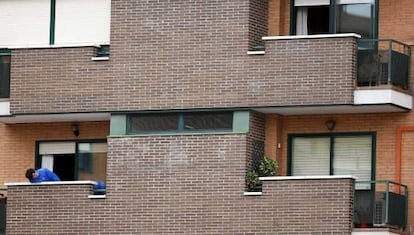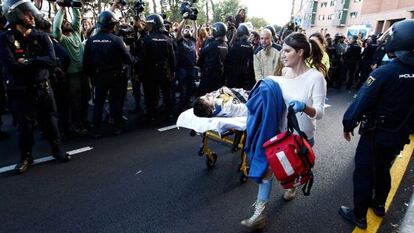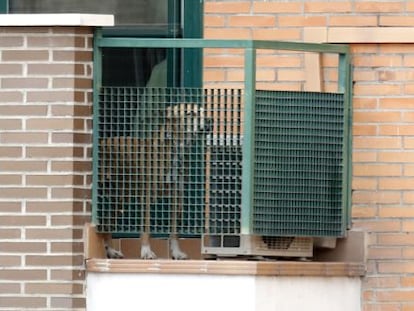“The dog had to be destroyed as we had nowhere to leave it”
Animal health expert upholds “harsh and sad” decision to destroy Ebola patient’s pet

Veterinarian José Manuel Sánchez Vizcaíno is not someone who can be accused of wanting to kill animals indiscriminately. Professor of animal health at Madrid’s Complutense University and the founder and designer of Spain’s first high-safety biological lab in Valdeolmos, outside of Madrid, he has conducted research that has helped all-but eradicate such dangerous animal diseases as African horse sickness, African swine fever and classical swine fever.
Nevertheless, Sánchez Vizcaíno stands by his decision to put down Excalibur, the 12-year-old dog of the nursing assistant infected with Ebola in Madrid. “The dog had to be destroyed,” he said. “The ideal thing would have been to transfer it in biosafe conditions, something we don’t have in Spain, put it under observation, wait 21 days, and discharge it, but we don’t have appropriate installations in Spain in which to leave the animal,” he says.
Spain lacks the kind of biosafety animal facilities that exist in the likes of Germany and the United States
Spain lacks the kind of level-four maximum biosafety animal facilities that exist in the likes of Germany and the United States, which feature airlock entrances, double filters each able to capture 99.99 percent of viruses and bacteria, incinerators for destroying dead animals on the spot, suits with segregated oxygen supplies, and chemical showers for disinfecting, among other protection measures. The ones that come closest in Spain are Sánchez Vizcaíno’s lab at Valdeolmos and another in Bellaterra, Barcelona, he says.
“From a biosafety point of view, putting the dog down was the best decision, a harsh and sad one, but there was no other option. You couldn’t run the risk that carers and veterinarians might be infected,” says Sánchez Vizcaíno, who was one of the experts consulted by Madrid health authorities before the dog was destroyed on Wednesday.
Curing that animal, with that virus, would have been the best achievement of my life”
“Curing that animal, with that virus, would have been the best achievement of my life, but if you don’t have the means, you cannot take the risk,” he explains.
Veterinarian Luis Martín Otero, the coordinator of the Biological Alert Laboratory at the Complutense University, which the Madrid regional government entrusted with destroying the dog, said no blood samples would be taken to see if it had the virus. The risk of taking a sample is much greater than putting the animal to sleep. “Ebola is a level-four virus, which obliges you take maximum safety and protection measures. The place where you should and can work with the virus is in a level-four laboratory,” he says.
Three animal rights activists injured

Three animal rights activists were injured, one of them seriously, as they tried to prevent health authorities from taking away the body of Excalibur, the American Staffordshire Terrier of Ebola-infected nursing assistant Teresa Romero, after he was put down in his owner's home in the Madrid satellite town of Alcorcón on Wednesday.
As the corpse was taken away in a sealed van, hundreds of protestors who had congregated in front of the apartment building broke through the police cordon and tried to block its exit. With their arms open, one of the activists rushed headlong into the windshield of the van, but was pushed away by a policeman. They fell and hit the curb, splitting their head open. Volunteers trained in first aid treated the protestor at the scene before they were taken to Alcorcón Hospital.
Two other women were also hurt in the clash, which saw the police begin hitting out with their batons indiscriminately while the crowd chanted: “Murderers, murderers.”
The van continued on its way to the town of Paracuellos del Jarama (Madrid), where Excalibur was incinerated.








































